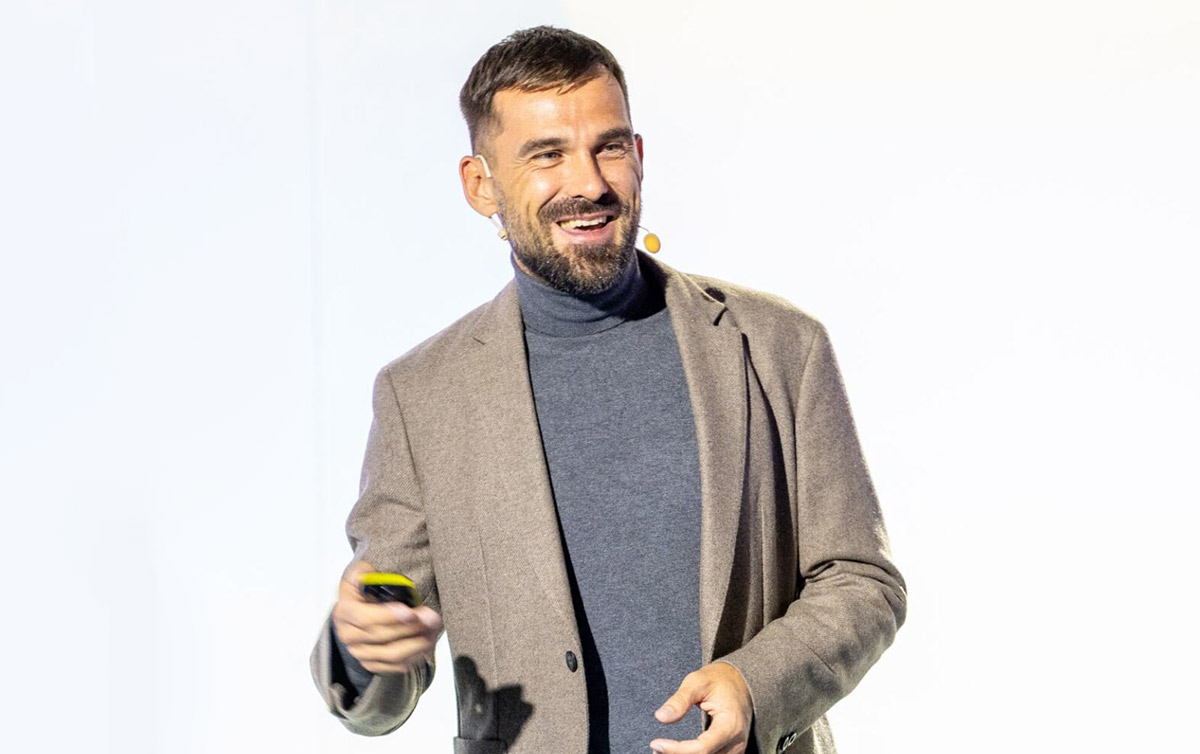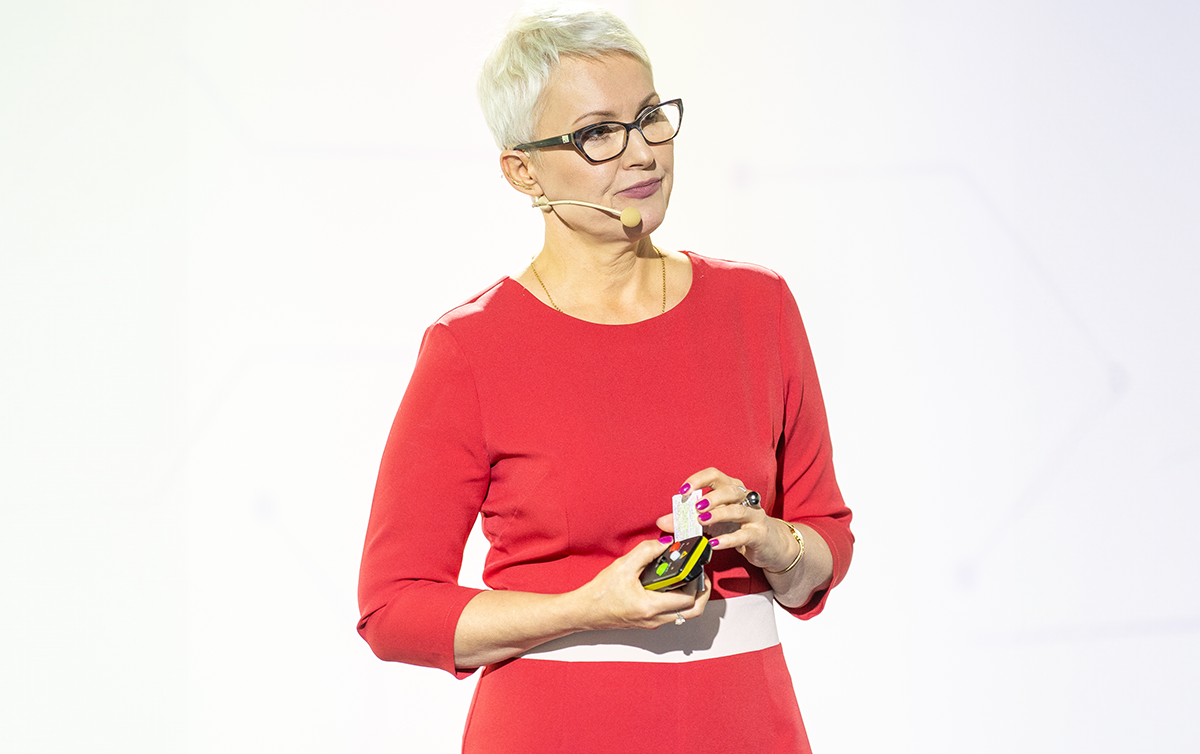“There are four principles of building healthy eating habits: using natural products, ensuring dietary diversity, following the “3 x NO” dietary model, and a long-term mindset. This will help you take care of your health for years to come,” says dietician and coach Jakub Mauricz. “The best diet for an employee is Carb Back-Loading. Its essence is to eat breakfasts and lunches rich in protein and fats, and meals containing higher amounts of carbohydrates at the end of the workday,” he stresses.
Well-being is an ecosystem, consisting of various elements. What role does healthy nutrition play in it?
Jakub Mauricz: Healthy nutrition is an important part of our overall health ecosystem. This had already been said by Canadian Health Minister Marc Lalonde, who in the 1970s produced a report on health perspectives of Canadians. The document includes the famous “Lalonde health fields”, grouping factors that affect human health. According to them, nutrition belongs to a “field” that affects health in as much as 53%.
The quality of our lifestyle is determined by 3 factors: healthy nutrition, physical activity and avoidance of stimulants. The less we smoke, the less alcohol we drink, the more often we exercise, the more we take care of healthy sleep and follow a healthy diet, the better for our individual health. So you can clearly see that all these factors are closely interconnected.
Thus, we should not treat the issue of healthy nutrition as a separate element, but as part of an entire ecosystem. Epigenetic studies show that healthy nutrition and physical activity are factors that, to a large degree, extend our lives and minimise the risk of diseases of civilisation, such as Hashimoto’s, insulin resistance, heart disease, overweight and diabetes.
In such case, what kind of eating habits should you build to take care of your well-being?
There are four simple principles to follow in order to take care of your health for years to come. Firstly, a good diet is based on unprocessed food. This means that we should always try to choose products that are as close to nature as possible. For example, instead of sausages, choose chicken breast, and instead of breakfast cereals with high sugar content, go for spelt flakes.
Secondly, products should be varied as much as possible. I am aware that it is a challenge in terms of the amount of time it takes to purchase them and prepare the dishes. However, it is possible to use a model in which we set 2 days as the time for implementation – that is, on Sunday we prepare dishes for Monday and Tuesday, on Tuesday – for Wednesday and Thursday, and at the end of the week – for Friday and the weekend.
Thirdly, it is worth following the “3 x NO” dietary model, that is, a diet with no wheat, no sugars and no trans fats. Of course, in the case of sugars, for example, it is not a matter of excluding them completely, but of eliminating refined sugars, i.e. those in doughnuts or buns.
And finally, eating habits should help us build a healthy diet in the long term. This means that strengthening of the habits should span not over weeks, but years.
And how important from a company’s perspective is healthy nutrition on the part of employee?
An employee who eats well is healthier and more efficient. A healthy diet strengthens their cognitive functions, i.e. stimulus processing. As a result, the employee’s focus and concentration improve. This allows them to perform more duties during an 8-hour shift. Thus, a healthy diet affects both the entire team and the company as a whole.
An employee who takes care of their diet also does not have physiological problems like reactive hypoglycaemia. In practice, better health means, for example, fewer sick leaves in the company. Importantly, if you follow a healthy diet, you also get better sleep, and healthy sleep – which affects brain health, among other things – is one of the fundamental conditions when it comes to creativity and overall productivity.
What are the latest global trends in workplace diet?
In foreign companies, it is increasingly common to find vending refrigerators not with sweet candy bars, but, for example, vegan bulgur, etc. Companies are also taking more and more steps to educate their teams about healthy nutrition. Likewise, the menus in cafeterias increasingly feature foods that benefit health.
A wide variety of dishes is crucial to the daily diet. When it comes to meat dishes, for example, corporate cafeterias are increasingly offering not only classic fried dishes, but also, for instance, stewed meat without batter. A separate issue, however, is whether supply and demand balance each other out. This is because it is often the case that despite our knowledge of healthy foods, we continue to eat the standard sweet candy bars or pancakes with cheese.
How do Polish companies compare to foreign ones in this respect?
Western trends are reaching Poland with some delay. On the other hand, compared to Europe, we are not too far from the average when it comes to the incidence of cancer, heart disease, overweight and obesity. Admittedly, though, we still lag behind with regard to physical activity, as indeed, according to the data, more than half of Poles are not physically active.
In this respect, the situation is different in countries such as Spain, for example. There, it is clear that parks, where one can do, for example, calisthenics training, are much more popular and enjoy high attendance. Meanwhile, it is still common in Poland for such exercises to take place sporadically, with only a small number of people interested in them.
What products should an employee’s diet consist of?
The diet must be well thought out and therefore based on specific knowledge. From the employee’s point of view, there are two types to choose from. The first option is a high-fat but low-carbohydrate diet. This means that you can eat, for example, pork knuckle, ribs or neck. The second option is a high-carbohydrate but low-fat diet. In this case, you can eat chicken with rice, turkey breast, fish, pasta or salad with olive oil.
You need to decide for yourself which flavours you prefer and consider which diet supports you better during the workday. In general, as for the very idea of such diets, another aspect is important – following a certain diet must not be accompanied by the feeling that it is an unpleasant necessity. Why? Because if a diet is to improve our health and well-being, it must be something sustainable, that is, something spanning over the long term.
Which dietary components can help reduce stress levels?
In case of stress, supplementation with so-called adaptogens is a helpful solution. These are plant-based ingredients that have the effect of inhibiting physical and mental stress. They can be found in, for example, roseroot (Rhodiola rosea), five-flavour berry (Schisandra chinensis) and ashwagandha. As regards stress, it is also important to pay attention to healthy sleep, as poor quality sleep can negatively affect, for example, the state of our adrenal glands, which will increase the risk of inflammation.
Healthy nutrition, proper supplementation and sleep make up a whole system of connections that determine our productivity and our very attitude to work. If we are able to build a good homeostasis, that is, the proper order of our physiological system, we are more productive as employees as well as more resilient to the stress that results from daily challenges at work and in our personal lives.
What to do to compose a correct “diet diary” for an employee? What should you pay the most attention to?
I think the key principle in this process is to avoid processed foods. So, when we are out shopping, we should first of all read the labels on products to know if they really contain healthy ingredients. Try to use the most natural products, and above all, try to eat large amounts of fruit and vegetables.
In this way, outpatient visits related to gastrointestinal disorders, such as heartburn, reflux and inflammation, can be resolved. The source of many such diseases is too little fibre and fluids in our daily diet. Fibre is hugely important because our live bacterial cultures need it. It is a health generator, and changes in the microbiome can activate diseases of civilisation, such as hypertension.
And how can our health be supported by healthy snacks at work?
Polish companies are increasingly organising “fruit Thursdays”, on which fruit is served on platters. This is a really good option for our health. Still, I believe that each of us should also have healthy snacks with them. It is nice if the employer makes sure that there are, for example, nuts, granola or oat bars in the office, but we should also take care of such products ourselves.
And what about beverages? We still drink mainly coffee, which under certain conditions can have an adverse impact on our health.
That’s exactly right. Excess coffee is not good for anyone and that is why it is considered a rather problematic drink. Coffee boosts dopamine a lot, while reducing the influence of neurotransmitters such as serotonin. On the one hand, coffee stimulates us, but on the other, it can also reduce our overall productivity.
If we can limit the number of coffees we drink to two a day, it will bring real benefits to our health, especially if we combine them with an adaptogen, such as ashwagandha. The effect of such coffee will last for 5-6 hours, which will also reduce the frequency of drinking it, while easing the burden on the stomach and the risk of heartburn and reflux.
The most important thing is adequate hydration of the body. So drink water, especially mineral water, and electrolyte drinks containing sodium, potassium and magnesium, that is, components that are properly balanced in the plant world. All it takes is about 35 ml of fluids for every kilogram of body weight. Also, eat anything that is moist, such as fruit, vegetables, soups, boiled rice or potatoes.
So what diet, specifically, out of those currently available, is best from the employee’s point of view?
The optimal one is Carb Back-Loading, a dietary system developed by John Kiefer. Its basis is to eat breakfasts and lunches rich in protein and fats, and after the workday ends, meals containing more carbohydrates than fats. You can start the day with an omelette, for example, and then have Thai soup on coconut milk with sprouts and shrimp or chicken.
This diet allows you to stabilise the entire glucose-insulin economy in the body. Carb Back-Loading is really a very good and effective nutrition system. At the same time, it is worth noting that the diet is the de facto framework we can adjust our diet to – be it a Polish or Mediterranean one.
How should a modern company go about educating its team on healthy nutrition?
From the company’s perspective, education in this area is of strategic importance. The question of organising training, for example, in the form of a webinar, rests, of course, with the employer. They should also use the language of benefits to encourage employees to actively participate in such an event. After all, it is often the case, unfortunately, that the employee, instead of absorbing useful information, scrolls social media at the time.
What is worse, such attitude will take its toll later on, because if an employee decides that they don’t have time to take care of their health, they will have to find time for treating illnesses in the future. Therefore, the employer should instil a sense of responsibility in each employee, emphasising that such training is of tangible value – both for the individual in question and for the entire team and the company as a whole.
And how can a company fit diet into a broader well-being strategy?
One of the key solutions as part of such strategy is ongoing information support, such as a newsletter to remind employees that healthy nutrition is important, and that disorders lead to a large number of diseases of civilisation. On the one hand, we are aware, for example, of the negative impact of exhaust fumes on our health, but on the other hand, we still forget that our bodies have the ability to self-regenerate; we just need to create the right conditions for it ourselves.
The education and information aspects of the well-being strategy make profound sense. Otherwise, employees may be exposed to chronic inflammation, for example. So from the company’s perspective, it is worth reminding employees to make sure they get the right amount of vitamins, minerals, electrolytes or protein in their diets. Otherwise, they may end up weakening their health, resulting in more absenteeism.





















